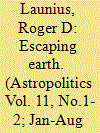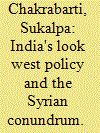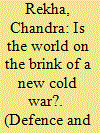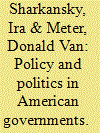|
|
|
Sort Order |
|
|
|
Items / Page
|
|
|
|
|
|
|
| Srl | Item |
| 1 |
ID:
116033


|
|
|
| 2 |
ID:
191119


|
|
|
|
|
| Summary/Abstract |
In the late 1950s, work began on the Kaptai hydroelectric dam, a massive project in the verdant Chittagong Hill Tracts (CHT), an area bordering northeast India, east Pakistan (today Bangladesh), and Burma (now Myanmar), largely populated by indigenous hill communities. At the time, the CHT was situated in newly created East Pakistan, and Kaptai had become a focal site for the development of hydroelectric power. In the process, Pakistan relied upon international networks, including global aid organizations and American multinational construction firms, to fulfil its development dreams; in return the United States found a useful ally to contain Soviet influence and the growth of communism in Asia. In the high stakes exchange of economic aid for political alliance-making, East Pakistani administrators, US State Department officials, and American corporations became inherently entwined in a shared vision of development, to the detriment of local ecologies and the indigenous peoples who lived within them. This article will explore how both the public and private sectors used the language of primitivity, wildness, and atavism to marginalize minority ‘tribal’ populations in the devastating name of development and modernity.
|
|
|
|
|
|
|
|
|
|
|
|
|
|
|
|
| 3 |
ID:
122526


|
|
|
|
|
| Publication |
2013.
|
| Summary/Abstract |
What if we viewed the history of human spaceflight somewhat less through the lens of Cold War politics, which admittedly was central to the race to the Moon, but more as an expression of what might be called a religion of spaceflight? There seems to be a deeply religious quality to advocacy for the investment in and support for human space exploration, lending to the endeavor of a "higher purpose" that helps to explain both the generous nature of the actual investment and the ultimate unwillingness of Americans to eviscerate space budgets despite less than full support for space exploration. This article examines religious conceptions as a means of analyzing what might be termed a "space gospel." I lay out here the proposition that human spaceflight may be viewed as a religion with similar attributes to those present in mainstream religious denominations. This approach to exploring the history of human spaceflight offers a different and useful frame of understanding that broadens basic conceptions about this aspect of the human past.
|
|
|
|
|
|
|
|
|
|
|
|
|
|
|
|
| 4 |
ID:
121063


|
|
|
|
|
| Publication |
2013.
|
| Summary/Abstract |
India shares historic ties with the Arab and Islamic world that cut across the spheres of culture, economy and politics. Described variously as our "extended" and "proximate" neighborhood in the diplomatic circles, the region is important for obvious strategic reasons in the fields of energy, trade, business, politics and security. The current upheaval in West Asia naturally has serious implications for India's strategic interests in the region. The unfolding of events bear the ominous possibility of a re-enactment of the Cold War politics with a vicious sectarian twist rooted in religious fundamentalism. Syria has become the current epicenter of a geopolitical showdown in the region with USA and Russia having locked horns, and the UN content to sit on the side-lines. This article would take a close look at the factors affecting and influencing India's role in Syria within the larger context of her West Asian foreign policy. It is recommended that India leads a collective diplomacy of the South to nurture and preserve a forward looking development agenda in West Asia.
|
|
|
|
|
|
|
|
|
|
|
|
|
|
|
|
| 5 |
ID:
137577


|
|
|
| 6 |
ID:
040064


|
|
|
|
|
| Publication |
New York, McGraw-Hill Book Company, 1975.
|
| Description |
xiii, 357p.Hbk
|
| Standard Number |
0070564280
|
|
|
|
|
|
|
|
|
|
|
|
Copies: C:1/I:0,R:0,Q:0
Circulation
| Accession# | Call# | Current Location | Status | Policy | Location |
| 015014 | 320.973/SHA 015014 | Main | On Shelf | General | |
|
|
|
|
| 7 |
ID:
148173


|
|
|
|
|
| Summary/Abstract |
This article analyzes disaster relief efforts for the 1954 Danube and Elbe River floods. Carried out jointly by the U.S. government and the Geneva-based League of Red Cross Societies, this food aid program affected Western and Eastern Europe, and marked an important moment in Cold War political and humanitarian history.
|
|
|
|
|
|
|
|
|
|
|
|
|
|
|
|
| 8 |
ID:
139366


|
|
|
|
|
| Summary/Abstract |
The crisis in Yemen has been complicated by number of actors, their interest and also policies of external powers. It cannot be analyzed by focusing only on Sunni-Shia conflict in Yemen and support of Saudi Arabia and Iran in terms of this sectarian division. The division within Yemen as South and North was product of colonial history and cold war politics. Conflicts among regions, sects, power struggle among elites and conflicts of interests and proxy wars of other States are major factors in shaping current situation of Yemen. The aim of this article is to identify the interests of different actors in the recent Yemeni conflict by analyzing their relationship in past and expected strategies for future
|
|
|
|
|
|
|
|
|
|
|
|
|
|
|
|
|
|
|
|
|